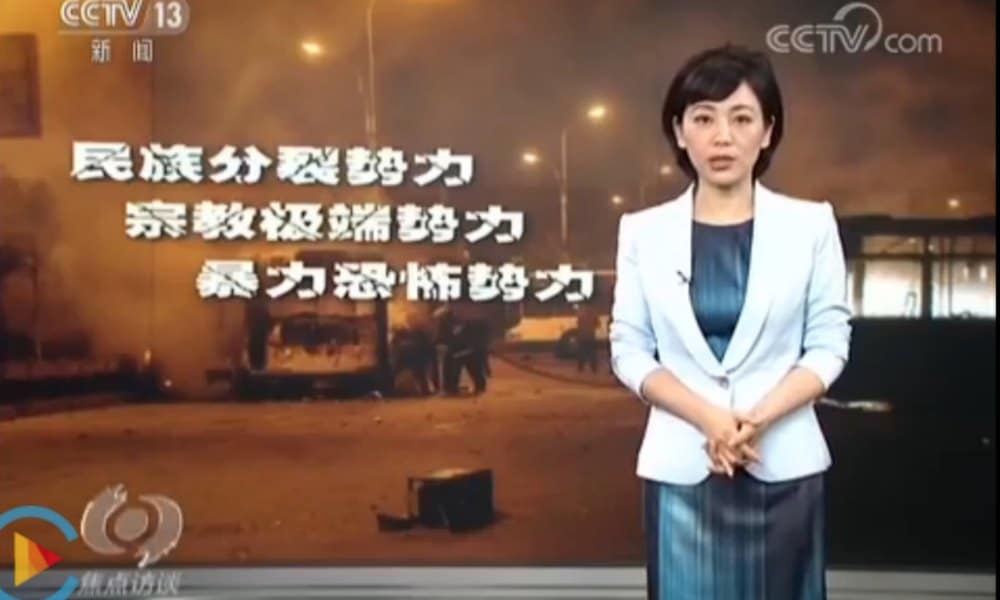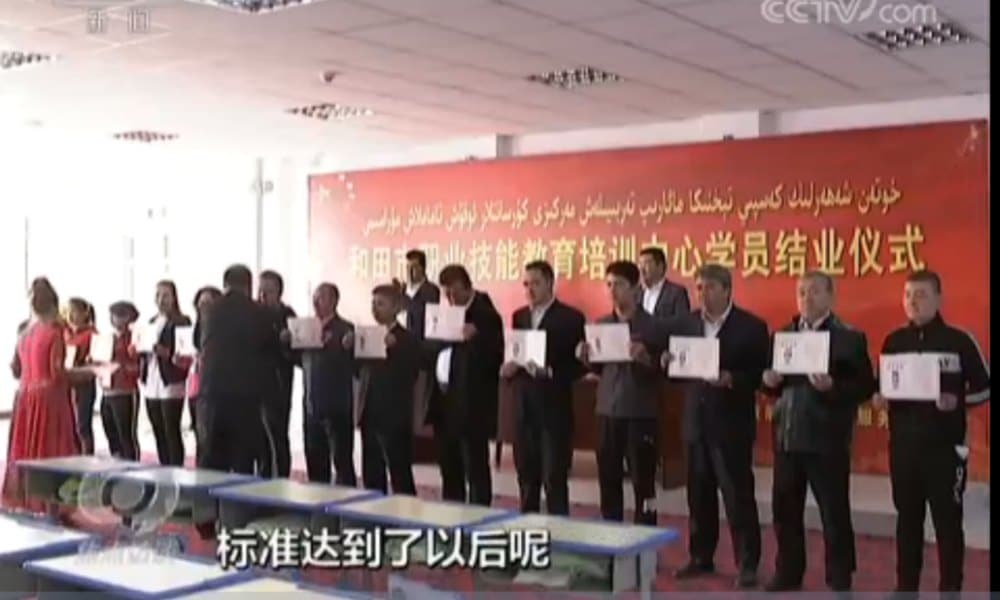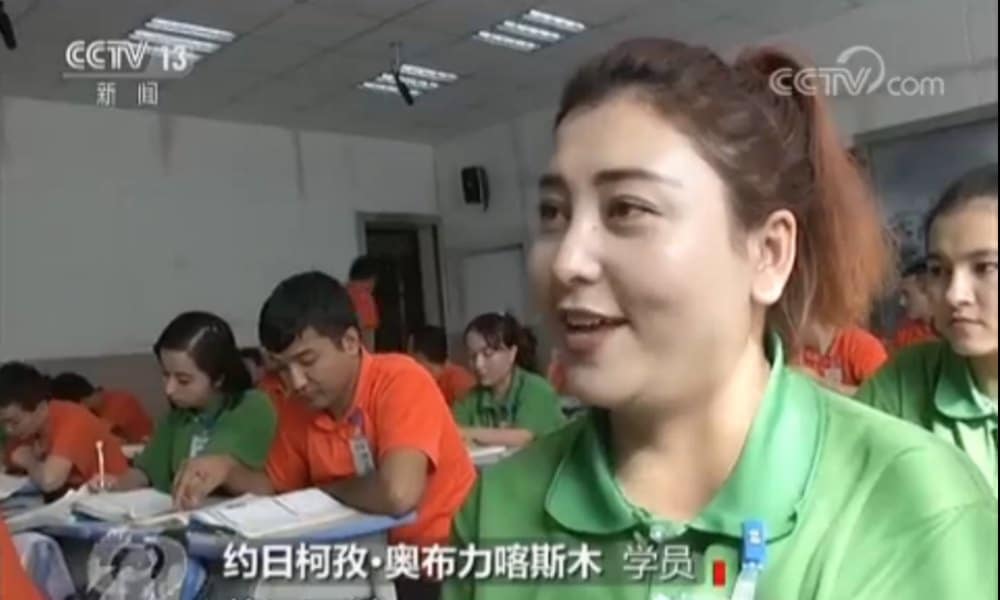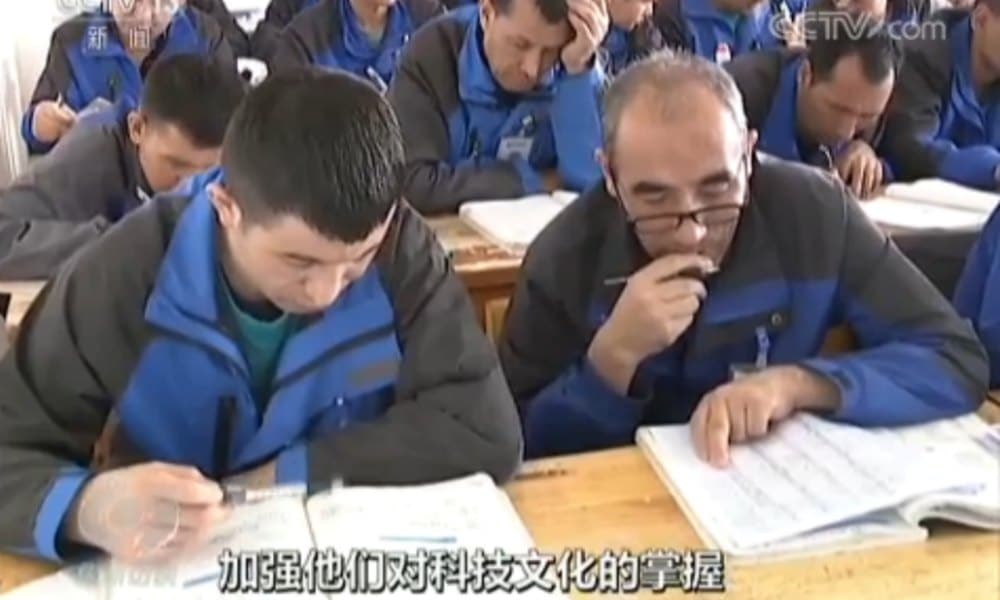On Tuesday, October 16 2018, the CCTV prime-time program ‘Focus Talk’ (焦点访谈) dedicated a 15-minute episode to the topic of Xinjiang’s ‘vocational skills educational training centers’ (职业技能教育培训中心), marking the first time for Chinese state media to extensively report on the existence of these controversial programs in Xinjiang.
‘Focus Talk’ is a renowned news program that has been aired by China’s state broadcaster since 1994. It is generally themed around various societal issues, and provides background analysis of various topics through interviews with officials and the public. The show’s official Weibo account has over 1,8 million fans.
Noteworthy is that the special Xinjiang-focused episode was aired hours after Xinjiang governor Shohrat Zakir (雪克来提·扎克尔) issued a statement to fend off international criticism on government-operated ‘Muslim internment camps,’ characterizing them as “people-oriented” facilities built to “fundamentally eliminate the environment and soil that breeds terrorism and religious extremism.”
Earlier this year, United Nations’ human rights experts said they had received credible reports that up to one million Muslim Uighurs may be held in extra-legal political detentions in Xinjiang, and called for them to be released.
Since 2014, China has implemented several measures to keep religious expressions to a minimum after a string of attacks allegedly committed by Chinese Muslim extremists. In March 2014, a knife attack at the Kunming railway station left 29 civilians dead. In May, 43 were killed when a Urumqi market was bombed. On June 22, attackers drove into a Kashgar police building and set off explosives. The list goes on.
The government responded to the increasing violence in 2014 with an ongoing crackdown that, at the time, resulted in more than 380 arrests within one month, and public controls on religious expression. In 2015, a ban on wearing burqa’s, or ‘face masking veils’ (面罩袍), was legally approved and went into effect on February 1st. In 2016, there were reports of local governments ordering restrictions on fasting during Ramadan. That same year also saw reports on the existence of “ideological training camps.”
This week’s efforts of Chinese media to highlight Xinjiang’s “educational centers” as a humane, positive, and constructive solution to defeat terrorism and extremism in the region (both in written state media and by state broadcaster CCTV) have made headlines in international media.
“China defends Xinjiang camps for Muslim citizens,” the Financial Times reported; “China admits to locking up Uyghurs, but defends Xinjiang crackdown,” CNN headlined; “China defends its ‘people-oriented’ Muslim reeducation program as job training,” Washington Post wrote.
On Twitter, New York Times reporter Chris Buckley tweeted about the CCTV episode, writing: “Dispelling any doubts that the Chinese government is trying to create a new narrative about its indoctrination camps in Xinjiang, CCTV on Tuesday broadcast a primetime program praising the camps.” Reporters from other newspapers also described the latest Xinjiang publicity as a “new narrative.”
The “Source Governance” Episode
On October 16, CCTV aired the episode in question. At the start of the program, the talk show host introduces the topic as follows:
“Terrorism and extremism are the public enemy of civilized society, and are the enemy of the international community. Since the 1990s, the ‘Three Evils’ of domestic and foreign ethnic separatist forces, religious extremist forces, and violent terrorist forces, have schemed and organized the execution of thousands of violent terrorist incidents in Xinjiang, victimizing a great number of innocent people, leading to the deaths of hundreds of public security forces, and causing incalculable damage.”

“The crackdown on terrorism and extremism is a global problem. To tackle this problem, Xinjiang has carried out the exploration of ‘source governance’ (源头治理) through the means of vocational skills educational training (职业技能教育培训), in accordance with the relevant laws and regulations. What is the result of this training? Let’s take a look.”
The show then shifts from the studio to the footage show in Xinjiang, with the voice-over saying:
“Recently, our reporters went to Xinjiang’s Hotan (和田市) to visit a vocational skills educational training center, just in time for the smooth graduation of some students.”

Mayor Alken Aili of the city of Hotan, a major oasis town in southwestern Xinjiang, then talks to reporters, saying:
“There are criteria for our students to complete the course. Firstly, they need to reach the qualified standards in the spoken and written national common language. Then they need to qualify in legal and regulatory knowledge, and then in their training and employment ability. Once they reach the standard, and qualify for it, then they can complete the course.”

A student named Abdul then speaks to the reporter, saying:
“Through my studies, I’ve deeply realized my mistakes. I will continue to study hard once I’m back. I’ll be a good citizen, and influence the people around me.”
In the program, the mayor of Hotan then explains the main contents of the learning center as learning standard Chinese, studying various laws (including criminal law, national security law, anti-terrorism law, etc.), and then learning vocational skills.
A female student tells reporters:
“Before, I couldn’t understand the language and struggled to get by. Now, if I continue to study hard, I’ll be able to work and make money anywhere.”

The voice-over continues to explain that many of the students at the Xinjiang training center do not master standard Chinese, have a “weak sense of the rule of law,” and face employment difficulties due to a lack of skills, leaving them extra vulnerable to turn to terrorism and extremism.

Another female student by the name of Turenisha Abdulla then says:
“If I wouldn’t have come here, I can’t imagine what would have happened. Perhaps I would have joined those religious extremists and take the criminal path. The Party and government have found me in time and saved me, giving me a chance to reform and start anew. I am very grateful.”
The voice-over explains that, looking at local needs and industrial development, the training center educates its students in various skills from beauty salon skills to food processing, and more “skills specific to ethnicity” (“民族特色的手工艺技能”), such as carpeting or making flatbread.

The program then further zooms in on the importance of education, and how teaching skills to students (of which some reportedly have been “eroded by religious extremism”) gives them better opportunities and a brighter future, and have “significantly improved the sense of security and happiness” in the region.

Throughout the episode, the CCTV voice-overs or commentators not once mention ‘Islam’ or ‘Muslims.’ They also do not label the educational center’s students as belonging to any particular religions. Instead, the program only mentions “terrorism” and “religious extremism.”
This is noteworthy because while foreign media have consistently reported about “Xinjiang camps for Muslim citizens” or “Uighur Muslims,” Chinese state media evade this issue by not mentioning any specific religion at all, but only mentioning the issue of extremism and terrorism.
Mixed Reactions on Weibo
The CCTV episode in question has triggered hundreds of comments on Chinese social media this week, which were quite mixed; many commenters expressed positive sentiments on the episode and its contents, but there were also others who were critical of the ‘educational centers.’
Comments in favor of the Xinjiang centers praised the government’s policies, with one micro-blogger writing: “Go and watch this episode of ‘Focus Talk’! It explains Xinjiang’s vocational education centers, which have been criticized as ‘transformation camps’ (转化营) by the West. They’re very real, very feasible, very effective, and very good.”
“Foreign journalists are distorting the facts,” others said: “I just came back from a business trip to Xinjiang, and it’s really much better there now than a few years before, so I need to support this.”
“We have to help a large number of Muslims to quit their Islam addiction,” another popular comment read: “It’s a quite frightening disease.”
“We can only adopt the correct extreme measures to combat the evil of extremism,” some in favor of the Xinjiang ‘education centers’ wrote in other threads discussing the program.
The negative comments often used sarcasm in their reactions, writing things as: “This is quite fantastic! Do they get winter- and summer holidays? When can they graduate? Can we visit there? And will we come out alive if we do?”
And: “What a great educational programme, we should implement it all across the country, so that we can all be treated this well!”
“But, isn’t this just exactly the same as a prison?”, one commenter said. “It’s really frightening, they all look like robots,” another person responded.
There are also Weibo users who simply want to know more about the ‘centers’, writing: “I want to know the reason for them to go there. And what if they do not qualify the standards [to complete], will they continue to stay there indefinitely?”
Some netizens indicate that what is happening in Xinjiang today might also happen in other provinces in China with a large Muslim population. Although Muslims live all over China, the majority lives in the northwestern regions of Xinjiang, Ningxia, Gansu and the Qinghai provinces.
“Xinjiang’s present-day is Ningxia’s tomorrow,” one Weibo user predicts.
Watch the full episode by CCTV here (no subtitles).
By Manya Koetse
Follow @whatsonweibo
Spotted a mistake or want to add something? Please let us know in comments below or email us.
©2018 Whatsonweibo. All rights reserved. Do not reproduce our content without permission – you can contact us at info@whatsonweibo.com
The post CCTV Airs Program on Xinjiang’s ‘Vocational Training Centers’: Criticism & Weibo Responses appeared first on What's on Weibo.